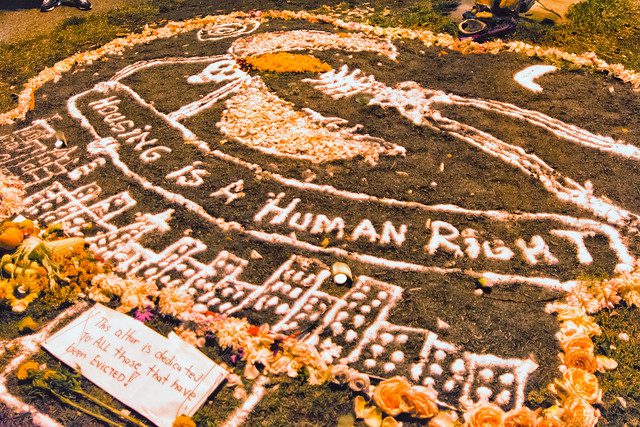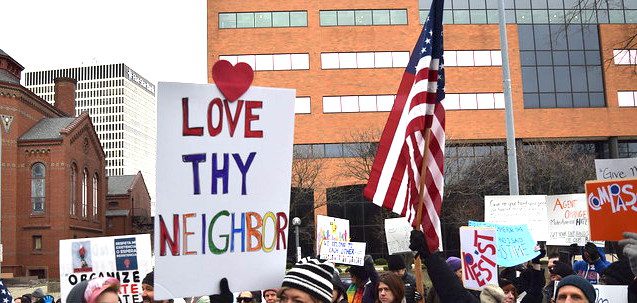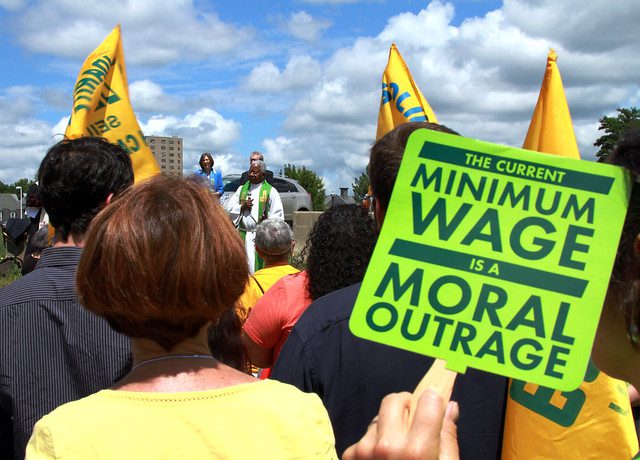
Photo by David Goehring via flickr, CC BY 2.0
“As long as there is no option of sleeping indoors, the government cannot criminalize indigent, homeless people for sleeping outdoors, on public property, on the false premise they had a choice in the matter.”—Ninth Circuit Court of Appeals
So we’re funding by national emergency? Rep. Maxine Waters (D-CA) says OK, here’s one. How many times have anti-immigrant meme-developers cried crocodile tears over homelessness? (As in “not one penny for refugees until we can take care of all America’s homeless veterans,” etc.) It’s a lot. It’s time for those folks, and their representatives, to put their money where their mouths are and support Rep. Waters’ Ending Homelessness Act of 2019, which would direct $13.27 billion in “mandatory emergency relief funding” over five years to specific federal housing programs and initiatives that could use it toward ending homelessness.
In which doctors don’t quite get it yet: A new study out from Enterprise Community Partners’ Health Begins With Home program found that more than half (54 percent) of renters surveyed have delayed medical care because they couldn’t afford it. Medical professionals were largely aware that their patients were struggling with housing affordability, and yet there was a disconnect—Nearly all (95 percent) lower-income renters say that rent is their most important bill, but 78 percent of medical professionals think their lower-income patients would prioritize their medical bills over rent. That says to us those medical professionals might not understand how rent and eviction works.
And more stats: “Eighty-two percent of the public thinks it is very or fairly important for their elected leaders to address housing affordability; this is a priority that crosses the political spectrum with 94 percent of Democrats, 80 percent of independents, and 69 percent of Republicans saying it is important. Four in five people in the United States agree that Congress (80 percent) and the president (78 percent) should ‘take major action’ to make housing more affordable for low-income households.”—Opportunity Starts at Home 2019 Opinion Poll. See many more interesting results from the poll here.
The city of Detroit’s infant mortality rates are far higher than the state overall, despite the fact that the city is home to a significant number of pre- and post-natal resources. A group of women are working to address that gap in service accessibility by bringing those supports right into neighborhoods with their Detroit Midwifery Clinic. The clinic will provide families with tools to connect to the variety of prenatal health, birthing options, and post-natal care that are available in the city. As midwives of color, the group also hopes that by residents simply seeing that they exist, their services and support will be more sought out—as one recent study showed better health outcomes for mothers and babies who were under the care of a midwife.
HUD’s Campaign: In an effort to protect residents from harassment, HUD launched a campaign and training initiative this month that will provide sexual harassment training to public housing employees and other housing providers. The initiative will also let residents know what they can do if they experience harassment in their homes. “No one should have to tolerate harassment or unwanted sexual advances in order to keep a roof over their head,” says Anna María Farías, HUD’s assistant secretary for fair housing and equal opportunity. This campaign is extremely important, but it’s also vital that there be a way to track the frequency of sexual harassment in housing, because only then will we truly know if these types of campaigns are making a difference. Sexual harassment and assault is a badly understood and unstudied problem that can drive poor women and their children into poverty. And we can’t ignore it, even in the nonprofit sector. Last year, we compiled some helpful tips for nonprofit housing providers, because there’s also potential for sexual harassment of residents by employees or contractors.
After a ProPublica expose in 2016 about Facebook’s in-app advertising product that allowed landlords, agents, and lenders to discriminate in its hyper-targeting of the consumers it wanted viewing their ads, the company faced a lawsuit from civil rights groups. Facebook recently settled with the groups and said it was working to change those elements of its advertising product, but last week, HUD chose to take action with its own lawsuit. In its announcement last week, HUD said the company violated the Fair Housing Act, and by enabling a scenario in which people could be denied even seeing housing ads based on their national origin, sex, religion, or disability, among other things, citizens who were discriminated against were denied the ability to file their own lawsuit.
Take That! The idea of a homeless shelter in a desirable San Francisco neighborhood didn’t sit too well with residents, who launched a GoFundMe campaign to raise money for a lawyer to block the project. (Why do people suck?) Luckily, a rival GoFundMe campaign has raised more money, including a couple of hefty $10,000 donations. Faith in humanity restored!
A “socioecological” model of gentrification that can be employed to predict gentrification has been created by a group of researchers. Using a range of “people, place, and policy,” factors, the model is based on over a decade’s worth of collected data. While our next question is, “once you can predict that an area will gentrify, is it already too late?,” an interesting predictor from the model is that more racially mixed neighborhoods are more likely to experience gentrification that those with high concentrations of Black or Latino residents. Even though there are a whole host of reasons why people leave neighborhoods—from whether they are forced to because of unaffordable housing costs or because their neighborhood is too disconnected from opportunity, we appreciate the different ways the field is trying to capture them all and use that to inform policy solutions.
A Living Wage: We’re such fans of the work that Nationwide Children’s Hospital is doing in Columbus, Ohio. We’re previously written about the hospital’s collaboration with a local community development corporation to address the social determinants of health and stabilize neighborhoods. Now we learned that Nationwide is raising its minimum wage to $15 an hour, which will affect 1,800 employees. Another 2,000 employees who already make that much will also get raises, according to this report. Bravo!
High housing costs make people sick. According to the 2019 County Health Rankings, 11 percent of households in the U.S. are severely burdened by housing costs, meaning they spent more than 50 percent of their income on housing. Households that are severely cost burdened tend to be renter households, have higher food insecurity, more child poverty, and have fair or poor health. This is definitely a must-read.
The Rockefeller Foundation has taken some by surprise with its announcement that it is, somewhat abruptly, winding down its flagship climate resilience program, 100 Resilient Cities as of July. You’ll hear more about 100 Resilient Cities and the connections between resilience and community development in the next issue of Shelterforce, out in a few weeks.
The National Low Income Housing Coalition released its annual report analyzing the affordable housing gap. Unsurprisingly, there’s a severe shortage of affordable rental homes for those who need them most. According to the report, there’s a shortage of more than 7.2 million rental homes that are affordable, or available, to extremely low-income renter households.




Comments